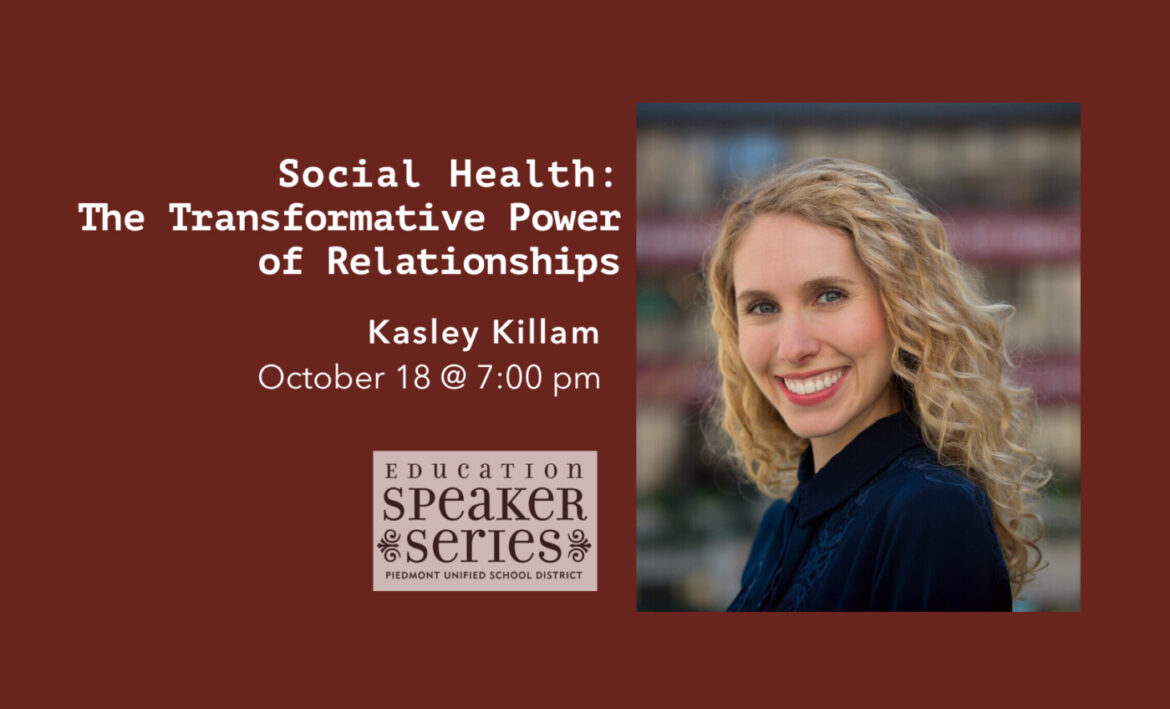Oct. 18 headliner Kasley Killam will speak on the importance of relationships for mental health, well-being, and academic success. “Time spent socializing is time well spent,” says Killam.
Parents, teachers, and adults who work with teenagers don’t need to rely on empirical studies to find evidence proving adolescent children are experiencing stress, anxiety, and depression resulting from feelings of loneliness or social isolation. While a recent large-scale study shows these conditions in teens have doubled between 2012 and 2018, what adults and teens seek — especially as we emerge from the worst of the pandemic — are evidence-based strategies and everyday techniques for achieving improved mental health.
The Piedmont Education Foundation’s October Speaker Series headliner, Kasley Killam, MPH, appears Oct. 18 with a program titled, Social Health: The Transformative Power of Relationships. Killam is a social health expert and holds a master’s degree from the Harvard School of Public Health. Since 2020 she has led the nonprofit Social Health Labs which, with its solutions for widespread loneliness, offers programs for increased human connection and community. Her essays and op-eds have appeared in The New York Times, Scientific American, Washington Post, and others. Killam, active on the national public speaker circuit, has presented her expert findings in the Bay Area at Google and Stanford University.
“The pandemic has forced [the] greater understanding that health is not only physical and mental, but also social,” Killam says in an interview. “Without close, supportive relationships and regular interaction, we cannot thrive. My work focuses on how to improve social health — the dimension of well-being that comes from connection and community. Because the seeds for a socially healthy life are sown during childhood and adolescence, parents and teachers have a vital role to play.”
Which means that in homes and classrooms, modeling matters. “Kids are sponges, absorbing the values, attitudes, and behaviors of people around them, so it’s crucial for parents to show rather than tell them that social health matters, and demonstrate how to be socially healthy,” she says. “This means spending quality time with family and friends, participating in the community, and making social health an overall priority.”
With busy lives, and often feeling stressed themselves, adults may struggle to find motivation or energy and patience for learning and practicing new techniques. For those helping youths handle social pressures while also trying to motivate them to succeed academically it can feel like an overwhelming challenge.
What is important to understand in order to help youth successfully navigate emotional health?
“Parents want their kids to succeed, so often put pressure on them to study, do their homework, and focus on school. Of course these habits are important to develop, but it may surprise parents to know that social connection can also lead to better academic performance. Research has shown that more connected students feel more motivated, are more engaged in class, score higher on tests, and are more likely to graduate. In other words, time spent socializing is time well spent.”
Kasley Killam, MPH
Asked about the strategies she will deliver in her presentation that differentiate between the roles played by parents and educators, Killman emphasizes that parents, peers, and teachers combine to make up different parts of a child’s overall social ecosystem. “To help prevent loneliness and promote social health from a young age, we need to take action at home, in school, and on the playground. I’ll share suggestions for how to do so during my talk.”
Visit https://www.kasleykillam.com/ and https://www.socialhealthlabs.com/ to learn more about Killam and her work. Purchase tickets for the event at https://piedmontstore.org/.

